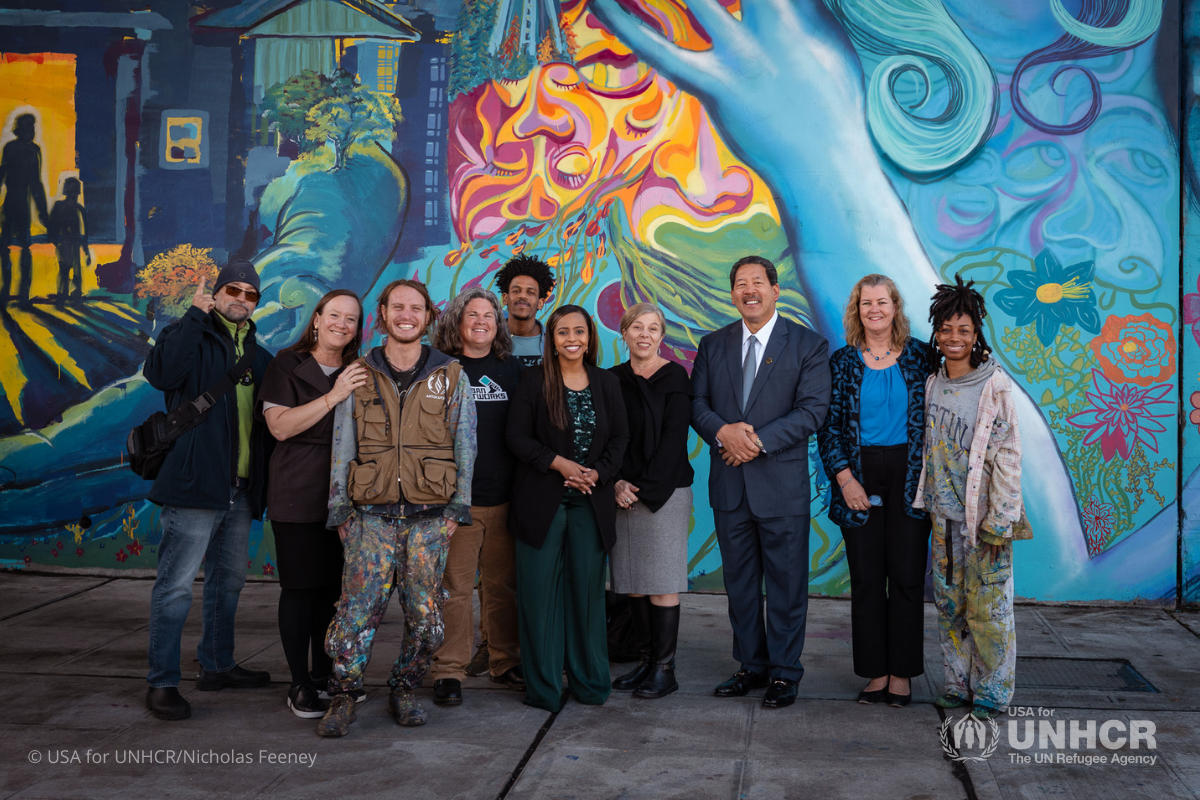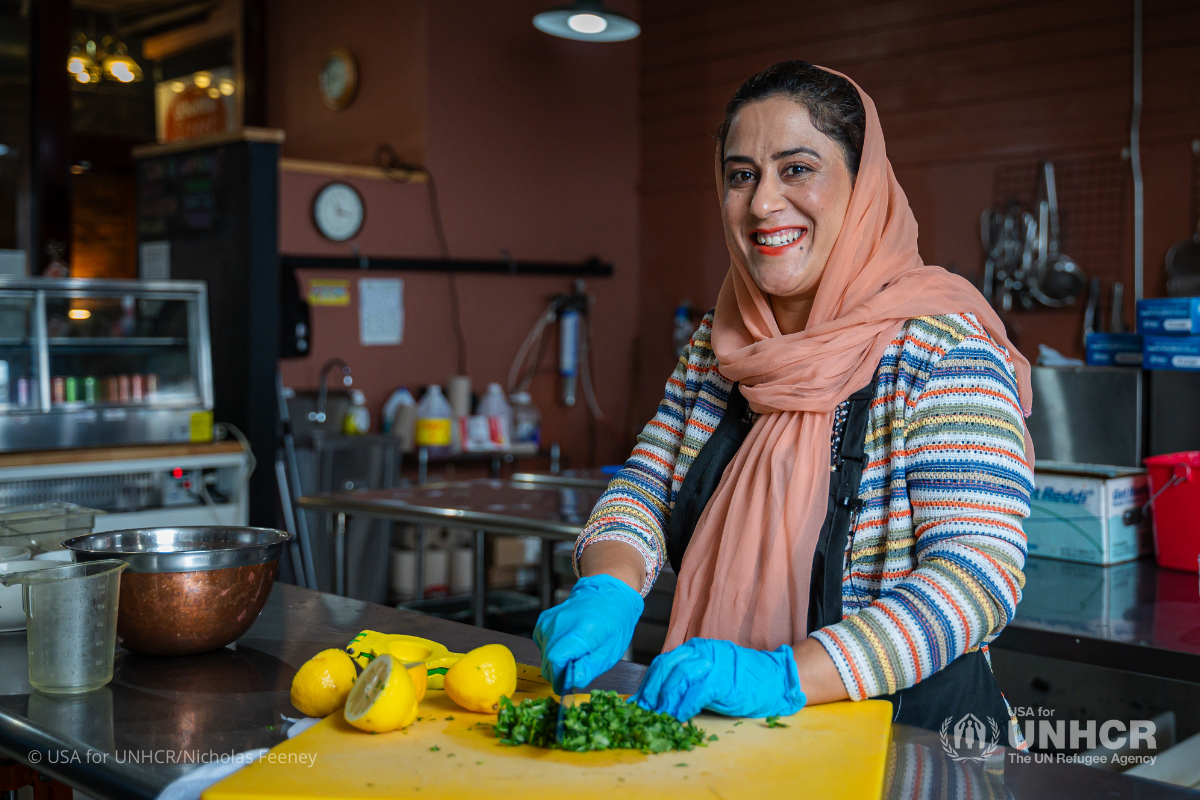Equity, sustainability and community: the threads that bring artisan women together at Seattle’s Refugee Artisan Initiative
Visitors stepping into the Refugee Artisan Initiative (RAI) workshop in Seattle’s Lake City neighborhood are warmly greeted with the steady hum of fabric cutters and sewing machines. The artisans are busy making handmade bags using upcycled materials or filling orders for custom-made merchandise. Others in the workshop are putting the final touches on their latest dress designs.
RAI is a local Seattle non-profit with the stated mission of partnering with refugee and immigrant women to help them achieve their dreams. But, according to RAI’s founder, Ming-Ming Tung-Edelman, the vision of the organization is rooted in celebrating the skills and resilience of refugee and immigrant women.
“The women walking in our doors hear the sewing machines; they smell the fabric and touch the fabric. It's something familiar to them because often [sewing] is a skill they need to survive — making their own clothes for themselves and for their family,” shares Ming-Ming. “So why don't we celebrate the skill [the artisans] have and celebrate their resiliency and what they bring to the table.”
RAI also celebrates the resilience and skill of Ming-Ming’s own family. She is an immigrant originally from Taiwan who has lived in the United States for nearly 40 years and has a deep understanding of the challenges refugee and immigrant women face when trying to restart their lives in the U.S. As a child, Ming-Ming watched her grandmother, a seamstress by trade, raise a family and rebuild in a new country.
After fleeing war or persecution, one of the most effective ways people can rebuild their lives with dignity and in peace is through the opportunity to work and earn a living. RAI meets refugee and immigrant women where they are; providing work opportunities at the Lake City workshop and flexible, at-home work that empowers the artisans to overcome traditional barriers to employment for refugee women, such as child care responsibilities, language skills and lack of transportation. The goal is to help every artisan earn a fair income and to achieve economic stability.
Since opening its doors in 2017, RAI has employed nearly 50 women from seven countries. The workshop, affectionately known as the “Maker Space,” is not simply a place of employment for the refugee artisans; the support they receive helps them build the future they want for themselves and their families. Many walk through the doors at RAI never having held a formal job.
“If they never worked before, we help them open a bank account and earn their first paycheck, and I'm so thrilled that some of the women end up buying their first car,” Ming-Ming shares with pride. “And we have four women in the past seven years able to put down payments for their first home, which I think illustrates that the sky's the limit.”
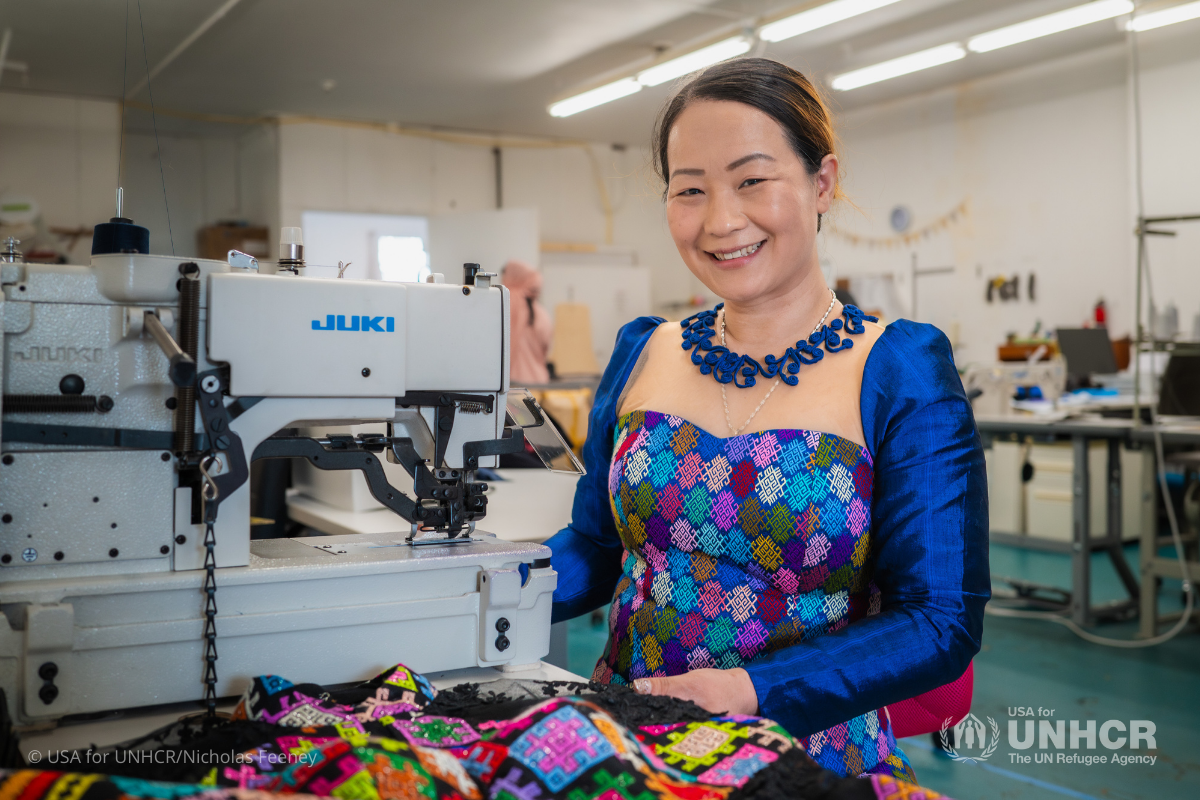
That sentiment is often echoed when the women RAI employs start dreaming of their futures. For many, like Julie (above), a refugee from Myanmar and one of RAI’s first employees in 2017, opening a dress-making business is a big part of that dream.
“Julie's the first person I said, ‘You know what? More people need to know these amazing talents, that she knows how to make Burmese buttons, beautiful embroideries and beautiful dresses,” says Ming-Ming.
Julie, who is a Christian, arrived in the U.S. in 2009 after fleeing religious persecution in Myanmar - a country with a history of religious persecution, including against Rohingya Muslims and Christian minorities. On her journey to safety, Julie and her family fled to Thailand and then Malaysia before being selected for resettlement in the United States.
Resettlement is a solution for refugees like Julie in acutely vulnerable situations who have a credible and documented fear of returning to their home country. Globally, fewer than one percent of refugees needing resettlement receive it. For the tens of millions of refugees globally who will not be resettled, UNHCR, the UN Refugee Agency works to promote economic inclusion – advocating for their right to work in host communities to achieve self-reliance.
While resettlement is a lifesaving solution and offers refugees a chance to restart their lives in a safe country, the transition can be very challenging. Initially, Julie struggled to adjust to her new life in the U.S. — the culture and the language were challenging, it was expensive, and then, her husband abandoned the family. She was alone and needed a job. Fortunately, she found Ming-Ming and RAI.
“I'm a single mom. I have three kids,” Julie shares. “I [was] working, but [it was] too difficult sometimes if my babies are sick. So, I joined RAI. I [can] stay at home and I’m sewing at home. It's better for me.”
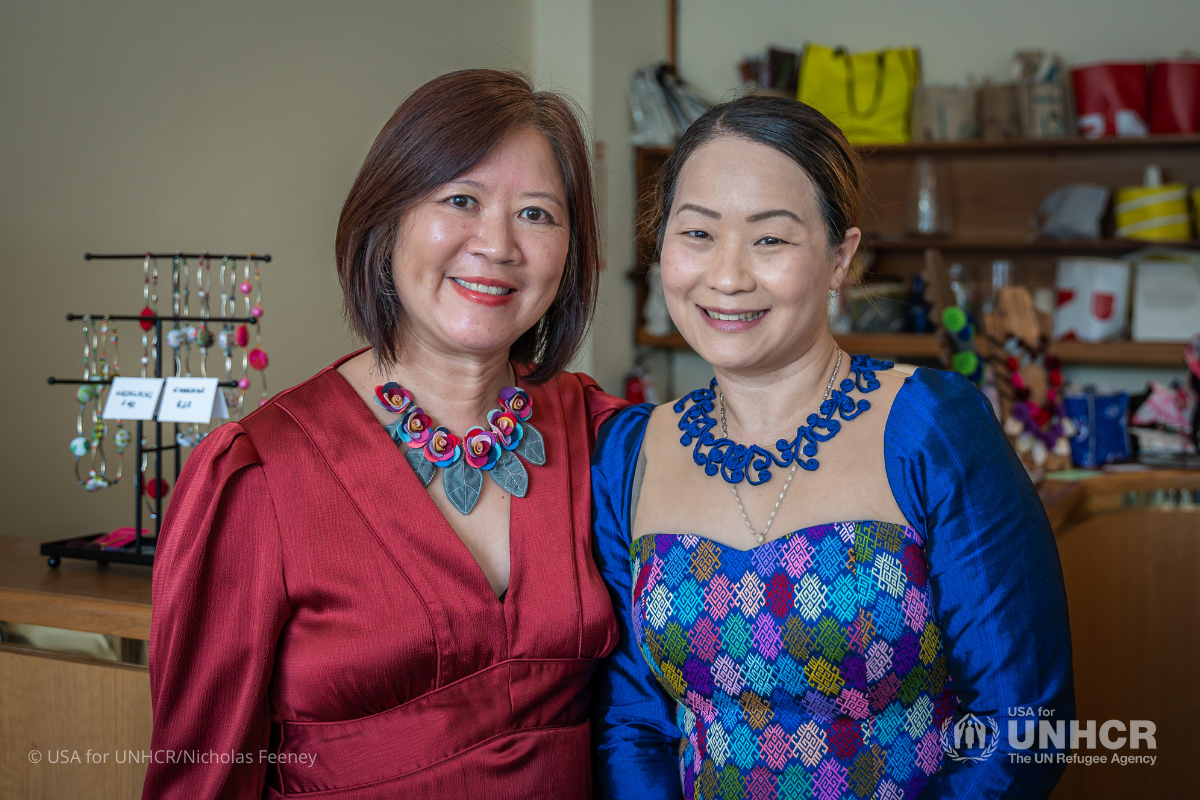
While working at RAI, Julie is also pursuing her dream of becoming an independent dressmaker and opening her own business to supplement her RAI income. Working with Ming-Ming, Julie is exploring ways to find customers for her dresses — online, to direct buyers and in the RAI shop in Seattle.
RAI’s commitment to the Seattle community goes well beyond its work with refugee and immigrant artisans like Julie; RAI is committed to sourcing environmentally sustainable materials for all its textiles and merchandise. “Our impact has been creating jobs and diverting textiles out of landfills,” says Ming-Ming. RAI upcycles textiles and has kept nearly 65,000 pounds of material out of landfills in the last seven years. Discarded burlap coffee bags from local roasters and even damaged fire hoses are used to construct bags sold on RAI’s website.
RAI’s sustainable practices have been recognized locally and internationally and are paying dividends. In 2023, RAI was selected to source and provide conference bags for the annual Asia-Pacific Economic Cooperation meetings in Seattle. Working with 50 businesses across the region, RAI provided sustainably sourced conference bags to nearly 3,000 attendees.
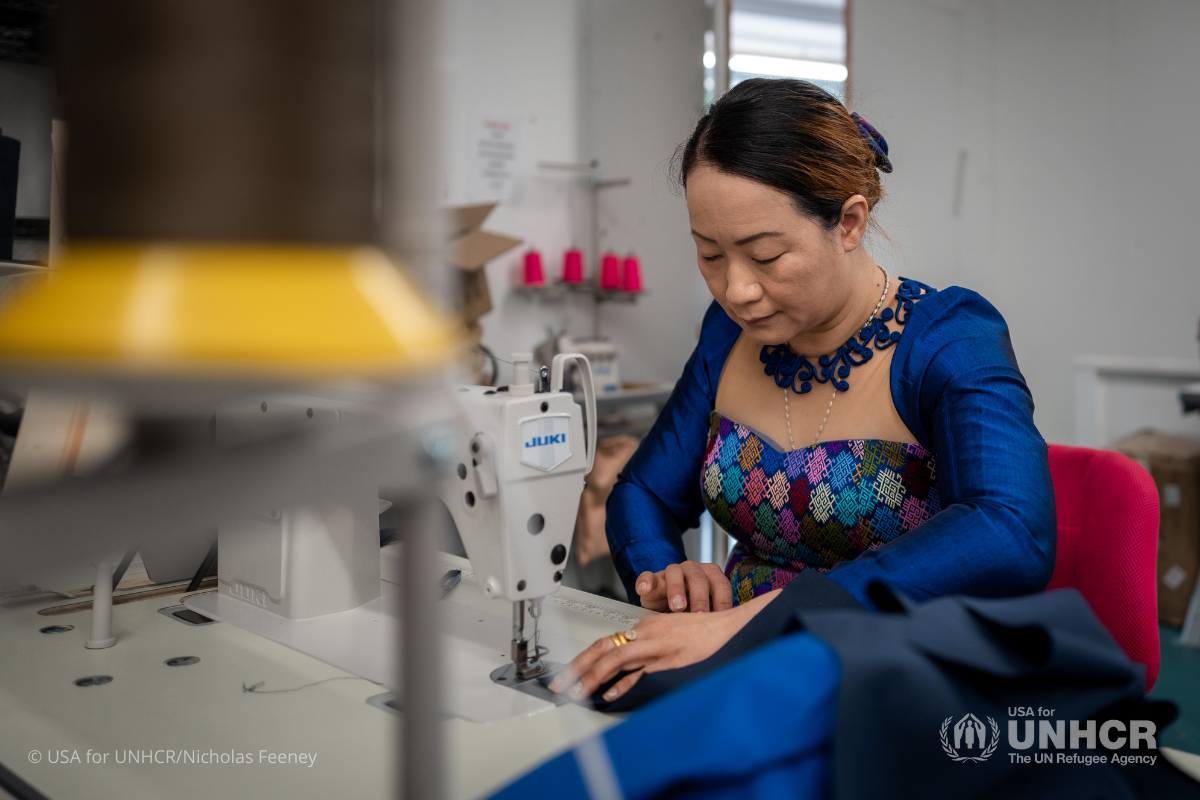
In May 2024, Ming-Ming was awarded Recycler of the Year by the Washington State Recycling Association for her leadership and commitment to recycling and waste prevention.
Accolades aside, Ming-Ming is driven to grow RAI as a place of creativity and employment that continues to meet refugee and immigrant women where they are. In 2024, RAI welcomed six more artisans and developed an in-house English as a second language program.
Moving forward, Ming-Ming has big plans for RAI. The organization is preparing to kick off its first capital campaign to raise funds to expand its work, modernize the workshop space to accommodate at least 100 artisans and create a permanent home for a future Refugee Arts and Culture Center. She also hopes that RAI will serve as a model for other communities to invest in refugee women and use the practices of sustainable development and upcycling to create jobs, build economic independence for refugee women, and offer entrepreneurial skills training and support.
“I don't know what the organization will be 10 years from now, but like I say, the sky's the limit,” Ming-Ming shares with a smile.
How to Help:
UNHCR, the UN Refugee Agency supports the full journey of refugees who have been forced to flee violence, war and persecution. Our donors help refugees in their greatest time of need, and their support builds awareness for resettled refugees living in the U.S. Refugees like Julie and organizations like the Refugee Artisan Initiative have woven themselves into the fabric of American society and are making lasting contributions to their communities. With your help, more refugees will have the opportunity to build peaceful lives and give their families a bright future.
